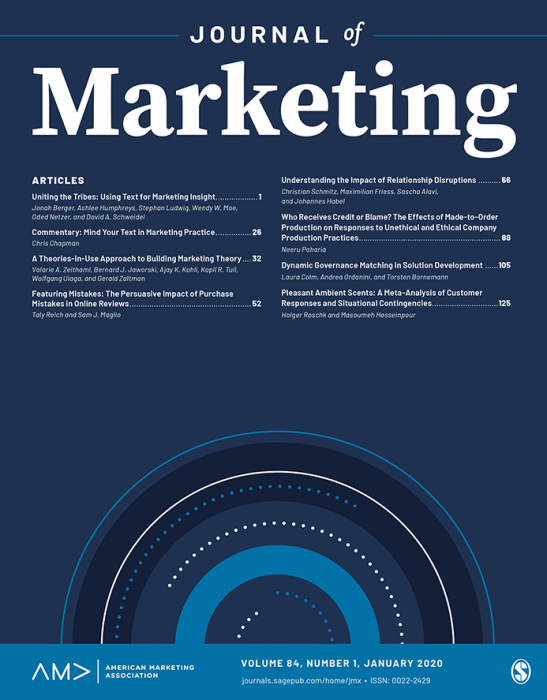EXPRESS: Fit to Persuade: The Role of Source–Appeal Congruence in Cancer Screening Decisions
IF 10.4
1区 管理学
Q1 BUSINESS
引用次数: 0
Abstract
Despite being preventable and curable, cervical cancer (CC) claimed 350,000 lives globally in 2024 due to the low adoption of CC screening (CCS). An analysis of the institutional context in India revealed a lack of awareness and disempowering sociocultural stigma and norms as two critical barriers. Simultaneously, trustworthy spokespersons emerged as key enablers of CCS adoption. Three incentive-compatible randomized field experiments were conducted to evaluate the fit and effectiveness of message sources (表达:适合说服:来源-上诉一致性在癌症筛查决策中的作用
尽管可以预防和治愈,但由于宫颈癌筛查(CCS)的低采用率,2024年全球宫颈癌(CC)夺去了35万人的生命。对印度制度背景的分析显示,缺乏意识和社会文化耻辱和规范是两个关键障碍。同时,值得信赖的发言人成为CCS采用的关键推动者。进行了三个激励相容的随机现场实验,以评估信息来源(医生与同伴)和吸引力(信息性,突出疾病的死亡风险,与赋权,解决健康/CCS相关的社会文化禁忌)对CCS采用的适合性和有效性。虽然医生和同行在传递信息信息时比信息图表更受欢迎,但医生的付费意愿最高。然而,当对等体传递授权信息时,采用率最高。作者还发现,相对于信息图表,医生和同行降低了对CCS(一种预防性服务)的价格敏感性。该研究强调了可信来源和上下文特定的信息呼吁之间的一致性在提高采用方面的重要性。政策制定者可以优先考虑低成本、针对具体情况的干预措施,通过利用同伴作为可信的信使来解决社会文化障碍。仅在印度,这种方法就可以提高36.5%的采用率,并使2107万妇女接受CCS。
本文章由计算机程序翻译,如有差异,请以英文原文为准。
求助全文
约1分钟内获得全文
求助全文
来源期刊

Journal of Marketing
BUSINESS-
CiteScore
24.10
自引率
5.40%
发文量
49
期刊介绍:
Founded in 1936,the Journal of Marketing (JM) serves as a premier outlet for substantive research in marketing. JM is dedicated to developing and disseminating knowledge about real-world marketing questions, catering to scholars, educators, managers, policy makers, consumers, and other global societal stakeholders. Over the years,JM has played a crucial role in shaping the content and boundaries of the marketing discipline.
 求助内容:
求助内容: 应助结果提醒方式:
应助结果提醒方式:


